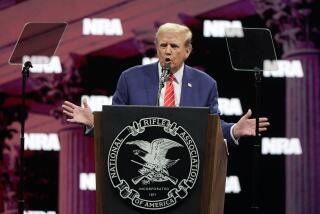Mitchell Against Bullet Tax, Gun Seller Fee Hike
- Share via
WASHINGTON — Senate Majority Leader George J. Mitchell said Wednesday that he opposes taxes on ammunition and increased license fees for gun dealers, two gun control ideas that the Clinton Administration is considering.
The Maine Democrat, turning testy when pressed about the politically sensitive issue, decried what he called “an interesting tendency whenever we pass legislation” to devaluate its significance and suggest some further step. He referred specifically to the recently passed Brady bill, which requires handgun purchasers to wait five business days for a background check.
“Passage of the Brady bill was significant,” he declared. “I think the assault weapons ban passed by the Senate but not yet by the House is significant. I think we should concentrate our energy and our efforts on trying to gain its enactment into law by next year.”
President Clinton, however, has indicated that he is prepared to go much further and faster than his party’s Senate leader in pressing for new gun control measures beyond the Brady bill and assault weapons ban. In a recent interview, he said it is time to challenge the powerful National Rifle Assn., arguing that gun violence has created enough public concern to support a ban on some guns as well as “a lot of other reasonable regulations.”
Clinton and his aides, although agreeing that the Brady bill and the assault weapons ban are significant, have stressed that they consider the measures relatively modest first steps in efforts to control gun violence. Moreover, although Clinton already has signed the Brady bill into law, the provision for banning assault weapons still faces a tough test in the House. It is embodied in the crime bill, which the Senate already has passed.
Nevertheless, Administration officials believe that the time is ripe to press for additional controls.
“The feeling here at the highest levels is that the moment is right to move seriously on gun controls beyond Brady and assault weapons,” a senior White House aide said Wednesday. “The politics of gun control has never been better. There’s no conclusion on what else ought to be done, but you’ll see more.”
Atty. Gen. Janet Reno, addressing a meeting of state law enforcement officials Wednesday at the Justice Department, called the Brady bill “just a start” in the Administration’s anti-violence campaign. She vowed a determined effort to get guns out of the hands of youths, who increasingly have been involved in violent crimes.
However, Mitchell showed little enthusiasm for new gun control measures. Asked whether the Senate Democratic leadership might propose additional controls, he said: “If you’re asking me whether I have specific further gun control measures that I intend to make--if that’s the question--the answer is no. And I’ll await the President’s proposals, if they’re forthcoming, and review it at that time.”
Clinton, in an interview in the Dec. 9 Rolling Stone magazine, suggested that the Administration will consider pushing for federal laws identical to some tough state gun control laws and will examine whether to increase federal license fees for the nation’s 286,000 gun dealers and require greater background checks for the dealers.
Because of the politics of gun control in Maine, Mitchell has treaded cautiously when it comes to the NRA and has declined to embrace Clinton’s call for challenging the organization. He said the Senate should judge individual issues and not “cast it in terms of challenging anyone.”
Maine includes many hunters and others who oppose gun controls, and the NRA has endorsed Mitchell’s opponents in past elections.
More to Read
Get the L.A. Times Politics newsletter
Deeply reported insights into legislation, politics and policy from Sacramento, Washington and beyond. In your inbox twice per week.
You may occasionally receive promotional content from the Los Angeles Times.










